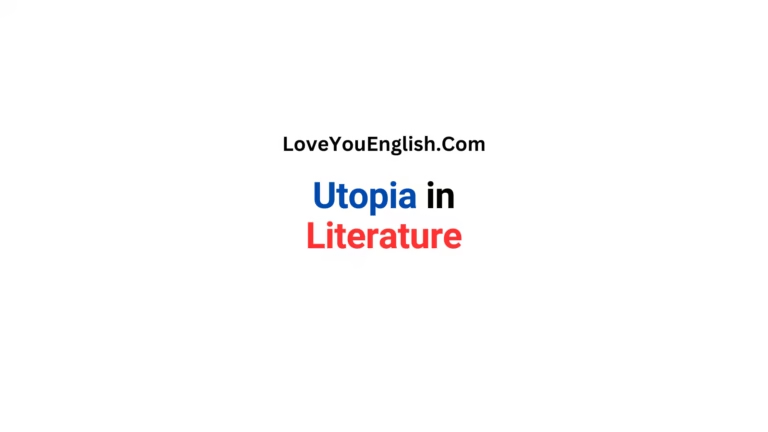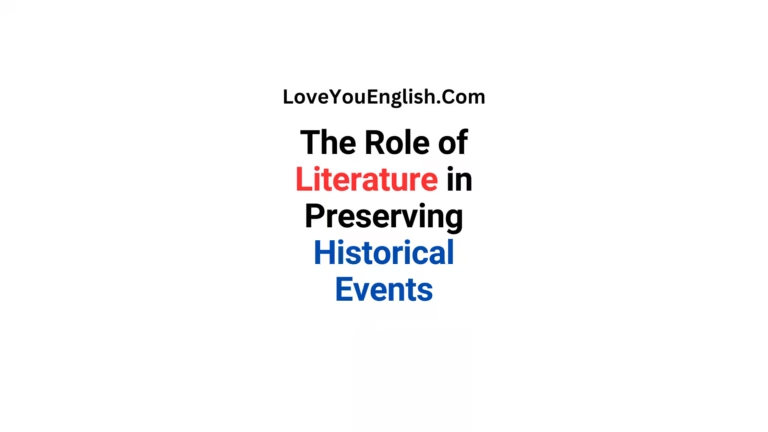How Historical Events Have Shaped English Literary Themes
Sharing is caring!
English literature is rich in diversity, creativity, and depth. It reflects not only the creativity of writers but also the historical events that have shaped their thinking and the world around them.
Over time, the themes in English literature have been greatly influenced by major historical events. From wars and revolutions to social changes and discoveries, these events have played a key role in shaping how writers see the world and express their ideas.
We will explore how historical events have influenced themes in English literature, from the medieval period to modern times.
1. The Medieval Period and the Rise of Religion
The medieval period, lasting roughly from the 5th to the 15th century, was marked by the dominance of religion. Christianity played a huge role in shaping people’s beliefs and lives. This period saw the rise of themes of morality, spirituality, and the struggle between good and evil in literature.
One of the most famous works from this time is Beowulf, an epic poem that focuses on the hero’s battle against monsters. The themes in Beowulf reflect the struggle between good (Beowulf and his people) and evil (the monsters). The presence of religious ideas in literature during this time was strong, as Christianity was slowly becoming the central force in Europe.
Similarly, medieval literature was also influenced by the idea of chivalry, a code of conduct for knights, which often mixed religious devotion with ideas of honor and bravery. Works like The Canterbury Tales by Geoffrey Chaucer, which depicts a group of pilgrims on a religious journey, illustrate how religion influenced the themes of everyday life and the human condition.
2. The Renaissance and the Age of Discovery
The Renaissance (14th to 17th centuries) marked a period of great intellectual and artistic change. It was a time when people began to challenge traditional views of the world. There was a renewed interest in science, art, and humanism—the belief in the potential and value of human beings.
During the Renaissance, England experienced significant historical events, such as the reign of Queen Elizabeth I. This was a time of exploration, with the discovery of new lands, and a growing interest in science and philosophy. Writers began to explore themes of individualism, the power of human reason, and the complexities of human nature.
William Shakespeare, the most famous playwright of the era, wrote about a variety of themes influenced by these events. For example, in his plays like Hamlet, Macbeth, and Romeo and Juliet, Shakespeare explored the nature of power, fate, and human desires. His works also reflected the uncertainty of the time, where questions about life, religion, and politics were being asked more than ever.
The Renaissance also saw a rise in the theme of exploration, both in terms of geography and the human soul. Writers like Sir Thomas More and Francis Bacon delved into ideas about society, politics, and what it means to live a good life, influenced by the period’s focus on discovery and intellectual growth.
3. The English Civil War and the Restoration Period
The English Civil War (1642–1651) was a major conflict between the monarchy and Parliament. The war resulted in the execution of King Charles I and the brief establishment of a republican government under Oliver Cromwell. This event had a huge impact on literature, as it challenged ideas of monarchy, authority, and religion.
During the English Civil War, many writers focused on themes of political conflict, power, and authority. John Milton, for example, wrote Paradise Lost, a poem that explores themes of freedom, rebellion, and the fall from grace. Milton’s work reflected the political turmoil of his time, with its focus on the struggle between God and Satan and the concept of free will.
After the war, England entered the Restoration period, marked by the return of the monarchy under King Charles II. This brought a shift in the themes of literature, moving towards themes of pleasure, hedonism, and the questioning of religious and political authority. Playwrights like John Dryden and Aphra Behn wrote about love, politics, and social behavior in ways that reflected the more relaxed and extravagant atmosphere of the period.
4. The Industrial Revolution and the Victorian Age
The Industrial Revolution, which began in the late 18th century, brought about massive changes in society. It was a time of great technological advancements, but also of social upheaval. As people moved from rural areas to cities to work in factories, traditional ways of life were disrupted. This period led to a rise in themes related to social inequality, urbanization, and the effects of industrialization on the human soul.
In literature, writers like Charles Dickens responded to the challenges of the Industrial Revolution by focusing on the harsh conditions of the poor and the growing divide between rich and poor. Works like Oliver Twist and A Tale of Two Cities are filled with themes of social justice, inequality, and the impact of industrialization on society. Dickens’ stories often highlighted the struggles of the working class and the need for reform.
The Victorian era, which followed the Industrial Revolution, was a time of great change in social values, particularly regarding morality, gender, and class. Writers like the Brontë sisters (Charlotte and Emily) and Thomas Hardy explored themes of love, marriage, and the constraints placed on women in society. The rise of realism in literature during this time also mirrored the growing concerns over the effects of industrialization on human relationships.
5. World Wars and the Modernist Movement
The 20th century saw two devastating world wars that had a profound impact on literature. The trauma and disillusionment caused by these wars led to a shift in literary themes. Writers began to explore themes of existentialism, the absurdity of life, and the disillusionment with the promises of modernity.
The aftermath of World War I brought about the Modernist movement in literature. Writers like T.S. Eliot, Virginia Woolf, and James Joyce experimented with new forms of writing, breaking away from traditional structures. Their works often focused on themes of fragmentation, alienation, and the search for meaning in a chaotic world. For example, Eliot’s The Waste Land explores the disillusionment of post-war society, with its fragmented structure reflecting the fractured state of the world.
World War II further deepened these themes, as writers like George Orwell began to explore the dangers of totalitarianism and the loss of personal freedom. Orwell’s 1984 is a famous example of a work that examines themes of surveillance, propaganda, and government control, inspired by the totalitarian regimes of the time.
The wars also led to a growing focus on psychological themes. Writers like Sigmund Freud and Carl Jung influenced literature by exploring the unconscious mind, dreams, and the complexities of human behavior. This shift in focus is seen in works like Woolf’s Mrs. Dalloway and Joyce’s Ulysses, which delve deep into the inner lives of their characters.
6. Postcolonial Literature and Themes of Identity
After World War II, many countries in Africa, Asia, and the Caribbean gained independence from colonial powers. This period of decolonization brought about significant changes in the world, and writers began to explore themes of identity, race, and the legacy of colonialism.
Postcolonial literature often deals with the impact of colonialism on the lives of individuals and nations. Writers like Chinua Achebe, in Things Fall Apart, and Jean Rhys, in Wide Sargasso Sea, examined the effects of colonialism on culture, identity, and self-perception. These works reflect the struggles of people in newly independent nations to reclaim their identities and define their futures in a postcolonial world.
The themes of race and identity continued to evolve in the 20th and 21st centuries, with authors like Toni Morrison exploring the African-American experience in works like Beloved. The legacy of slavery, racism, and the search for identity are central themes in her writing, reflecting the ongoing struggles of marginalized groups.
Conclusion
Historical events have played a crucial role in shaping the themes of English literature. From the rise of religion in the medieval period to the disillusionment caused by the world wars, literature has been a reflection of the times in which it was written.
These events have influenced writers to explore themes of morality, power, identity, and the human condition in ways that continue to resonate with readers today.
By understanding the historical context behind literary works, we can gain a deeper appreciation for how literature mirrors the world around us and helps us understand our past and present.
More topics:
- The Role of Shakespeare in Shaping English Literature
- Exploring Themes of Love and Loss in English Literature
- The Role of Humor in Shakespeare’s Comedies
- The Concept of Utopia in English Literature
- How to Approach Literary Criticism
- Women Writers in English Literature
- Epic Tales in English Literature: Beowulf & Paradise Lost
Sharing is caring!








